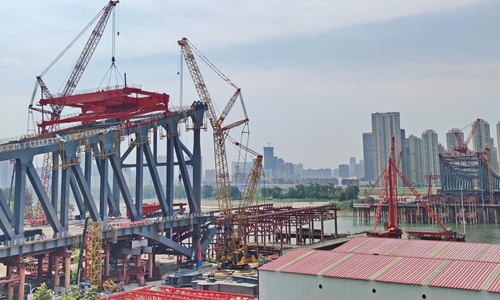Chinese govt ready to tighten belt, guarantees key investment
By Ma Jingjing Source:Global Times Published: 2020/5/22 19:53:40

The construction site of the No. 7 Jianghan Bridge in Wuhan, Central China's Hubei Province on Monday. Workers are accelerating construction amid the May Day holidays. Work officially resumed on March 24. It was also the first bridge construction project that has resumed in Wuhan after COVID-19 eased in the city. Photo: cnsphotos
The Chinese government is ready to tighten belt to optimize government spending, reflecting "unprecedented" challenges the economy faces due to the COVID-19 epidemic, while reaffirming the central government's commitment to achieving this year's economic and social development targets.
Governments at all levels should tighten their belts while the central government should take the lead by committing to negative growth in its budgetary spending, of which non-urgent and non-essential expenditures need to be reduced by more than half, according to the 2020 Government Work Report presented by Premier Li Keqiang at the opening of the third session of the 13th National People's Congress (NPC) on Friday.
However, Li said the country's proactive fiscal policy will be more active, government spending to secure people's basic livelihood will only increase, and investments in key sectors will be guaranteed.
Cong Yi, a professor at the Tianjin University of Finance and Economics, told the Global Times on Friday that governments' tightening their belts in administrative spending while investing more in key sectors are not contradictory, which will enhance capital allocation efficiency and better adopt fiscal policies to boost economic and social development.
According to the Government Work Report, China's deficit-to-GDP ratio surpassed 3.6 percent, up 0.8 percentage points over last year's. The deficit was projected to increase by a trillion yuan ($141.6 billion) on top of last year's 2.76 trillion yuan.
It's worth noting that all of the increased deficit, along with 1 trillion yuan in government bonds for COVID-19 control, will be transferred to local governments to reduce taxes and fees, cut rentals and interest rates, as well as expand consumption and investment.
This year, the central government aims to increase funds transferred to local governments by 12.8 percent to counter the economic fallout, the highest growth in transfer payments to local governments in recent years, Finance Minister Liu Kun said after the opening of the NPC.
Liu said that local governments' fiscal income is forecast to decrease 800 to 900 billion yuan this year.
"The arrangement shows that the central government is aware of the challenges China faces and the abundance of tools it has to steer the economy out of its temporary plight," Dong Dengxin, director of the Finance and Securities Institute at Wuhan University of Science and Technology, told the Global Times on Friday.
Yu Miaojie, deputy dean of the National School of Development at Peking University, told the Global Times that China's economy is expected to grow around 3 percent this year, a big drop from last year's 6.1 growth. "But China will still be the locomotive driving the global economy. As COVID-19 continues to devastate the world, major economies, including the US, the EU, Japan and Canada may see contractions this year."
"Entering into a new era that promotes high-quality development, deepening market-oriented reform, expanding higher-level opening-up and stimulating the vitality of micro entities all require fiscal support. In this regard, Chinese governments at all levels should tighten their belts in the long run," Dong said.
Posted in: ECONOMY